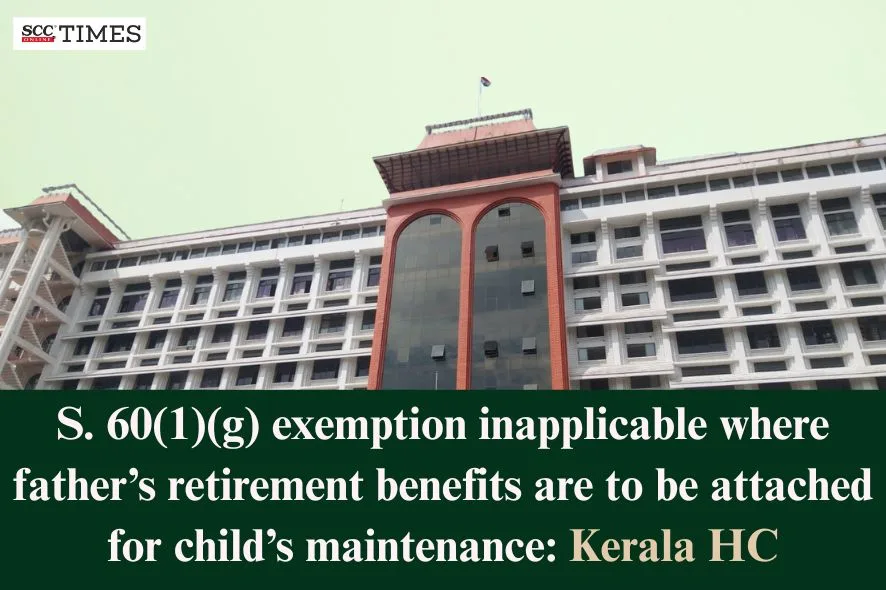Kerala High Court: In the present petition, the point for consideration was whether retirement benefits such as pension and gratuity were liable to attachment under Order XXXVIII Rule 5 of the Civil Procedure Code, 1908 (‘CPC’) in a claim for maintenance and educational expenses made by a minor daughter against her father. The Family Court had dismissed the petition for attachment before judgment citing the exemption under Section 60(1)(g) CPC. The Division Bench of Devan Ramachandran and M.B. Snehalatha*, JJ., set aside that order, holding that the exemption under Section 60(1)(g) CPC cannot be invoked to defeat a statutory and moral obligation to maintain one’s minor child.
Background:
The petitioner, a minor daughter represented by her mother, filed a claim before the Family Court seeking maintenance and educational expenses from her father, who had retired on 31-05-2025, as a LD Clerk in the Panchayat Department. It was alleged that though he had sufficient means and income, the father failed to provide any maintenance and educational expenses. She is a Plus Two student and has already incurred an expense of Rs 2,74,900 towards tuition and hostel fees. She further requires Rs 3 lakh for further studies and Rs 10,000 per month for hostel expenses, along with Rs 20,000 per month for maintenance over the next three years.
The daughter alleged that her father earned more than Rs 55,000 per month and was expected to receive approximately Rs 55 lakh as retirement benefits, pay revision arrears, DA arrears, etc. She sought attachment of these benefits before judgment, alleging that he was taking hasty steps to withdraw and divert the funds to defeat any decree passed against him. She claimed Rs 39.94 lakh towards past and future maintenance and educational expenses and sought attachment before judgment of the retirement benefits.
She had also filed a petition for attachment before judgment which was dismissed by the Family Court, while relying on Radhey Shyam Gupta v. Punjab National Bank, (2009) 1 SCC 376, on the ground that retirement benefits were not attachable in view of the exemption under proviso to Section 60(1)(g) CPC.
The father contended that he was suffering from various illnesses and was on leave for a long period because of which he would receive a nominal amount as retirement benefits. He stated that he had no house or landed property and also had to care for his aged parents. He submitted that his last drawn salary was only Rs 16,000, and it was impossible for him to pay Rs 20,000 per month for maintenance.
Analysis and Decision:
The Court acknowledged that maintenance of Rs 2000 per month had been ordered earlier by the Judicial Magistrate First-Class, but the father had defaulted in paying that paltry amount. The Court emphasized that the obligation to maintain one’s minor children is a fundamental, legal, and constitutional duty, and that the right of a wife or a minor child to maintenance supersedes the employee’s right to claim exemption under Section 60(1)(g) CPC.
The Court referred to Ramesh Chander Kaushal v. Veena Kaushal, (1978) 4 SCC 70, wherein the Supreme Court held that an order directing payment of maintenance is a measure of social justice and specially enacted to protect women and children, and it falls within the sweep of Article 15 (3) of the Constitution and reinforced by Article 39.
The Court clarified that the exemption under Section 60(1)(g) CPC is intended to protect employees after retirement and ensures their sustenance when their earning capacity comes to an end. However, this protection cannot be used as a shield to avoid fulfilling statutory and moral obligations towards dependents. The Court opined that the object behind Section 60(1)(g) CPC is to protect the said amount for utilizing the same for the benefits of the employee and family and to prevent vagrancy and destitution of the family members of the employee.
The Court distinguished Radhey Shyam Gupta (supra), noting that it involved a bank’s execution proceedings against a retiree, whereas the present case involved a claim by his own daughter seeking maintenance and educational expenses. The Court rejected the father’s argument that the retirement benefits were not attachable towards the daughter’s maintenance plea according to the exemption under Section 60(1)(g) CPC and observed that the daughter could not be equated with a creditor who was attaching the retirement benefits of an employee for a debt.
Accordingly, the Court, while allowing the petition, set aside the Family Court’s order denying the attachment before judgment of the father’s retirement benefits and directed it to reconsider the plea afresh.
[Rifa Fathima v. Salim, 2025 SCC OnLine Ker 12114, decided on 07-11-2025]
*Judgment authored by: Justice M.B. Snehalatha
Advocates who appeared in this case:
For the Petitioner: P. Rahul, Rajesh V. Prasad, Abhina L., Namitha Neethu Balachandran, Shyama S, Advocates.
For the Respondents: B. Mohanlal, P.S. Preetha, Motty Jiby Vasudevan, Abijith M., Avani Nair, Jayaprabha Arjun, Praveena T., Advocates.



